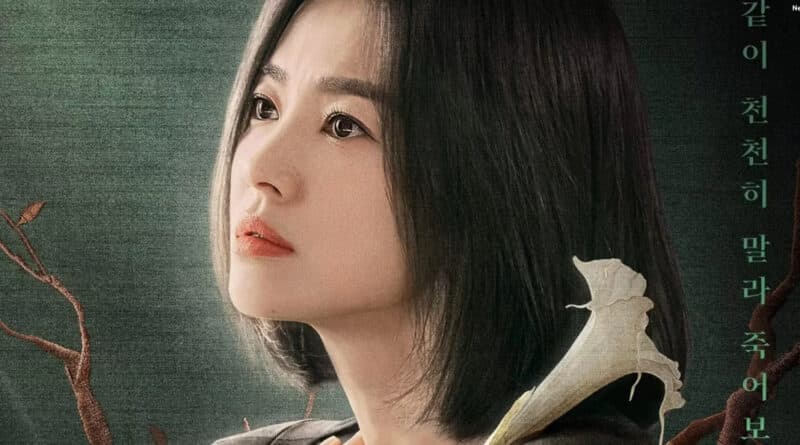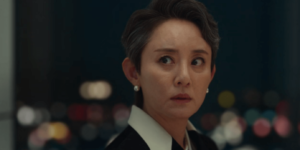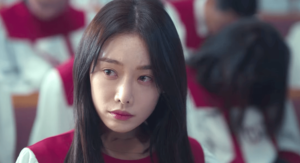Bidding farewell to beloved heroes and skillfully portrayed villains is never an easy task. However, the season finale of ‘The Glory’ provided an immensely gratifying conclusion to this immensely popular series centered around seeking retribution against high school bullies. Song Hye-gyo’s portrayal of a bullying victim earned her the prestigious Best Actress award at the Baeksang Arts Awards, while Lim Ji Yeon, who played her antagonist, secured the accolade for Best Supporting Actress.
By delving into various narratives of bullying and vengeance, the show elevated personal struggles into grand representations of morality and wickedness. With its captivating performances and universal themes, it was hardly surprising that ‘The Glory’ clinched the title of Netflix’s fifth most-watched non-English TV series of all time. In the inaugural season alone, viewers streamed a staggering 436.9 million hours, cementing its popularity.

The success of ‘The Glory’ can be attributed to a multitude of factors, including the exceptional script, skilled direction, remarkable acting, and more. What truly captivates me about ‘The Glory’ is its abundance of symbolic metaphors and concealed meanings woven throughout the storyline. These subtleties might have eluded your attention initially, but upon revisiting the series multiple times, the hidden revelations appear almost boundless. It is my wish that these intricate layers of significance enhance your appreciation of ‘The Glory’ to an entirely new echelon.
Outlined below are seven insightful aspects that may have eluded your notice during your initial encounter with ‘The Glory.’
1 : Proprietor of Eden Villa
In ‘The Glory,’ she embodies the concept of “God.” The possessor of a residential complex known as Eden Villa, she serves as a representation of the Garden of Eden found in biblical lore. Crowning the villa’s rooftop is her flower garden, within which angel’s trumpets gaze earthwards upon blooming, while devil’s trumpets cast their blooms skyward.
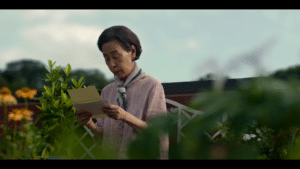
In the inaugural episode, she imparts the significance of those blossoms to Dong-eun. For observant viewers, this insight unveils hints about who might stand as allies or adversaries to Dong-eun. These subtle cues might evade notice on the posters, yet each character’s gaze aligns with the disposition of the rooftop flowers—individuals gazing upwards represent the bullies, while those looking downward signify Dong-eun’s supporters.

It is now clear that she assumed the role of an ever-watchful guardian over Dong-eun, akin to a constant divine presence, from the outset to the conclusion. This villa serves as an optimal vantage point to surveil Yeon-jin’s residence in Semyeong City, becoming a crucial element for Dong-eun’s pursuit of vengeance. Strangely, she provided Dong-eun with the apartment at a significantly reduced rate compared to the market price. Furthermore, she informed Dong-eun’s mother that Dong-eun did not reside within her building, and even evicted her when she attempted to ascertain Dong-eun’s address in an attempt to gain entry to Dong-eun’s apartment.

Eventually, the revelation emerged regarding the underlying motive for the elderly woman’s unwavering protection of Dong-eun. On numerous instances, they reciprocally rescued one another from peril. Throughout the series, the older woman served as a catalyst for Dong-eun’s realization that there were genuinely benevolent individuals around her, ready to offer assistance all along.
2 : Characters Bearing the Letter “O”
In the series’ initial episode, Yeon-jin’s mother cautioned her against associating with individuals whose names included the Korean letter “o.” As the drama unfolds, it becomes evident that a majority of the characters possess this particular letter in their names, leaving only Jae-jun and Sa-ra without it.
In a surprising twist revealed in Part 2, we discover that Yeon-jin’s mother herself has multiple instances of the letter “o” in her own name: 홍영애, Hong Young Ae. A truly spine-chilling revelation!
3 : Divine Entities within ‘The Glory’
Despite Dong-eun’s conviction that divine intervention eluded her, it becomes evident that one’s faith or belief isn’t always requisite to receive aid. As mentioned earlier, the proprietor of Eden Villa exemplifies a form of providence. Moreover, the drama incorporates three distinct spiritual figures: Yeon-jin’s shamanistic influence, Sa-ra’s Christian God, and Hye-jeong’s representation of Buddha. These deities collectively play roles in assisting Dong-eun’s quest for revenge, whether directly or indirectly.
Yeon-jin’s shamanism

Throughout the course of ‘The Glory,’ Yeon-jin and her mother rely significantly on their shaman. Nonetheless, Dong-eun managed to manipulate the situation by coercing the shaman into feigning possession by So-hee’s spirit during a ritual. So-hee had been a target of Yeon-jin and her group prior to Dong-eun’s involvement, and this orchestrated incident led to Yeon-jin losing her composure.

However, the shaman’s deceitful actions take an unforeseen twist as her fabricated prediction transforms into an actual occurrence. Intriguingly intertwined with the foreshadowing of the shaman’s impending retribution is the revelation that a higher authority will also deliver punishment upon Yeon-jin’s mother.
Sa-ra, the daughter of a prominent pastor at a mega-church, basks in a deceptive aura of piety within the church community. Contrary to appearances, she is among the bullies and grapples with drug addiction. However, Dong-eun succeeds in exposing the façade, unmasking Sa-ra and her father’s exploitation of the church as a cover for their wrongdoings and hypocrisy.
Hye-jeong’s Buddha
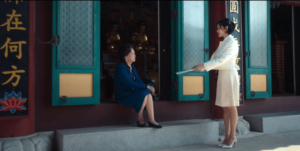
Hye-jeong was earnest in her efforts to ingratiate herself with her fiancé’s devoutly Buddhist mother by regularly visiting the temple. However, concealed complexities exist in the relationship between Dong-eun and Hye-jeong’s engagement to Do-young. Remarkably, Hye-jeong’s downfall sets the stage for the initial cascading effect of revenge for Dong-eun.
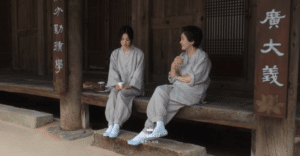
4. The Game of Go
The strategic game of Go assumes a central role within ‘The Glory,’ serving as a potent symbol throughout the narrative. Go, a board game that revolves around encircling a greater portion of the board with one’s own pieces to establish dominance, holds deep significance in the drama. This dynamic allowed Dong-eun to forge a closer connection with Yeo-jeong as she learned the game from him. Additionally, Go paved the way for Dong-eun to approach Do-young through her involvement in his Go club.
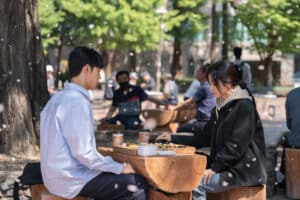
The drama skillfully portrays how the game of Go unveils instances of infidelity using well-crafted scenes and settings.


5. Triangle Kimbap
Another crucial metaphor in ‘The Glory’ revolves around kimbap. Dong-eun’s exclusive consumption of kimbap throughout the drama, devoid of any emotional connection, serves as a profound representation. This consistent choice underscores that Dong-eun’s sole mission in life centers on seeking revenge against her tormentors. She derives no gratification from the ordinary joy of savoring delectable food. While not every meal needs to be a sensory delight, Dong-eun takes the concept of sustenance as mere fuel to a somber and isolated extreme.
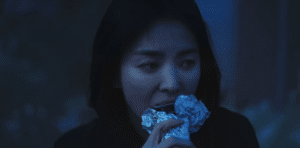
When Dong-eun extends a triangle kimbap to Do-young at a convenience store, he declines. This poignant moment underscores the stark contrast between Dong-eun and Do-young. At that juncture, Do-young remains distant from comprehending the life Dong-eun has endured, and he appears uninterested in doing so.
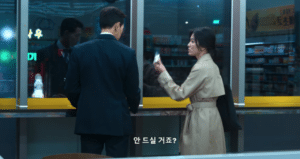
Towards the conclusion of the series, a scene unfolds in which he finds himself alone at the very same convenience store after enacting his own revenge. This particular moment serves as a powerful revelation, illustrating how he has now gained the capacity to genuinely empathize with Dong-eun.
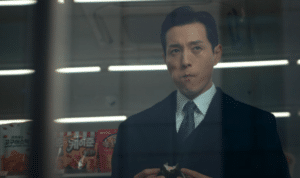
6. Double Meaning of 이모님을 구합니다
The phrase “이모님을 구합니다” holds a dual significance in Korean, signifying both “I will hire you” and “I will save you.” This expression appears both at the drama’s outset and its conclusion.
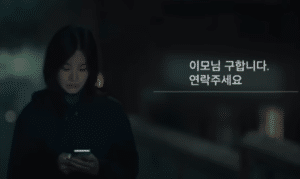
Upon discovering Dong-eun pilfering the Semyeong elementary school chairman’s discarded items, Hyeon-nam, the housekeeper of the chairman’s residence, refrains from involving the police. Instead, an unexpected camaraderie blossoms between them. Remarkably, Hyeon-nam evolves into a skilled operative, in
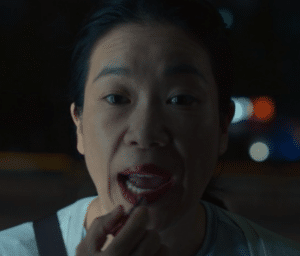

Upon stumbling upon Dong-eun scavenging through the Semyeong elementary school chairman’s discarded possessions, Hyeon-nam, the household aide of the chairman’s abode, opts against involving the authorities. Instead, an unforeseen bond forms between them. Impressively, Hyeon-nam transforms into an adept operative, injecting renewed energy and optimism into her life and her daughter’s prospects through her collaboration with Dong-eun. Their partnership proves serendipitous, time and again rescuing them from difficult situations.
7. Good Vs. Evil in The Glory
‘The Glory’ encapsulates the struggle between Good and Evil, highlighting how virtuous individuals can ultimately triumph over malevolent counterparts. While the primary narrative revolves around Dong-eun’s pursuit of retribution against her bullies, the drama also weaves in other character dynamics that exemplify the clash between good and evil.
Four Mothers in The Glory
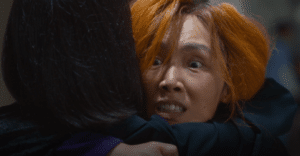
In ‘The Glory,’ Dong-eun’s mother, Mi-hee, who struggles with alcoholism, serves as a stark reminder that motherhood alone does not guarantee one’s inherent goodness. Regrettably, she emerges as the initial traitor and ultimately assumes the role of the primary antagonist in her daughter’s life.
Through her complete absence of maternal affection, Mi-hee abandons Dong-eun to endure the torment inflicted upon her by high school bullies and to navigate the world alone, devoid of protection. Her continued presence poses a significant threat to Dong-eun, nearly jeopardizing her quest for revenge against her adversaries. However, Mi-hee’s actions and self-centeredness do eventually catch up to her.
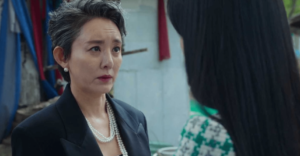
Within ‘The Glory,’ Young-ae, Yeon-jin’s mother, emerges as a significant antagonist. Her character embodies another facet of villainy in the narrative. She adopts a detached demeanor toward her daughter, Yeon-jin, and is primarily preoccupied with maintaining her family’s social standing and appearances. Unflinchingly protective of her priorities, Young-ae delves into extreme measures to safeguard her interests. These include a fervent obsession with shamanism, manipulating corrupt law enforcement to conceal misdeeds, and even resorting to murder when she deems it feasible to escape accountability.
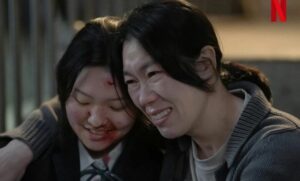
Sun-a’s mother, Hyeon-nam, exemplifies the nurturing and selfless mother figure one might wish for Dong-eun. Her loyalty to her loved ones is unwavering. In the face of danger, she shields Sun-a from her abusive father, willingly enduring further suffering to ensure her daughter’s safety. Hyeon-nam’s devotion to Sun-a extends to her unwavering determination to secure a hopeful and prosperous future for her. She even overcomes Yeon-jin’s threats to send her daughter abroad for education, displaying remarkable courage and commitment.
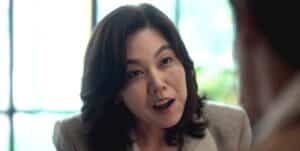
Sang-im, Yeo-jeong’s mother, embodies the role of a composed and understanding parent within ‘The Glory.’ Despite enduring the loss of her husband at the hands of a serial killer, she maintains her poise and dedicates herself to raising her son, who bears the emotional scars of his father’s death. Her approach is marked by subtlety; she never imposes her will on her son and wholeheartedly supports him, even when Yeo-jeong pledges to assist his girlfriend’s pursuit of revenge. As a physician and the head of a hospital, she commands respect from her colleagues.
Notably, Sang-im’s significance extends to episode 16, where she plays a pivotal role in saving both Dong-eun’s and her son’s lives.
Three Teachers

Dong-eun’s high school homeroom teacher exemplified a malevolent presence. Deliberately turning a blind eye to the torment inflicted on Dong-eun by her bullies, he dismissively labeled it as mere play. When Dong-eun confronted him, questioning how he would react if his own son faced bullying, her inquiry was met with a brutal slap. Nearly two decades after Dong-eun’s time as a student, that same teacher’s son plays a pivotal role in bringing the educator to account for his failure to address the violence perpetrated against Dong-eun.
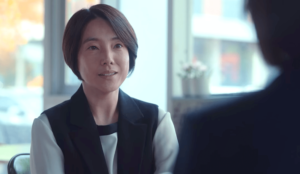
Nonetheless, amidst the turmoil at Dong-eun’s high school, there was a remarkable teacher. The nursing instructor was aware of the violence and made an effort to address the issue. Regrettably, her actions led to her dismissal due to the influence of the bullies’ affluent and influential parents, who pressured the school into letting her go. In subsequent events, Dong-eun approached the nursing teacher and implored her assistance for her revenge plan. The teacher became an invaluable ally in Dong-eun’s mission. As the revenge scheme unfolded to its conclusion, Dong-eun reciprocated the teacher’s kindness in a fitting gesture of gratitude.
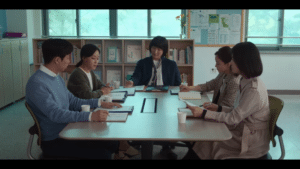
In striking opposition to the nursing instructor, Teacher Chu epitomizes the most reprehensible type of educator in ‘The Glory.’ He subjects his colleagues to bullying and is revealed to be a pedophile who previously taught at an elementary school before joining Dong-eun’s high school. When Dong-eun uncovers this unsettling truth, she ensures that he faces the consequences he rightly deserves.

Two Cops
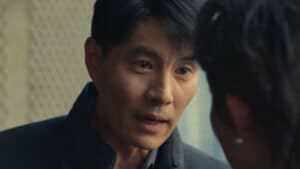
Young-jun embodies the quintessential corrupt cop. Motivated solely by greed, he is driven by a thirst for wealth. His repertoire of crimes is extensive, ranging from embezzlement and blackmail to tampering with evidence and even murder. He played a role in aiding Yeon-jin’s mother and supporting Yeon-jin’s attempts to conceal the truth. However, as the story unfolds, his actions ultimately catch up with him, leading to his downfall.

Detective Choi emerges as the investigator driven to uncover the truth behind the case. Initially, he found himself losing patience with Dong-eun during his inquiries. Yet, he soon discerned that there was a deeper dimension to her and her history beyond mere evidence. In fact, the unchecked bullying that remained uninvestigated or unaddressed led to the revelation of an additional 18-year-old murder. Determined to set things right, even if it might be long overdue, Detective Choi is resolute in his pursuit.
When Dong-eun expressed her gratitude, saying, “Thank you for listening to me,” he replied, “I have to, even though it is 18 years too late.” These words touched Dong-eun deeply, as she finally felt heard by someone.
While it remains uncertain whether the Part 2 finale marked the conclusion of a series or season, there are no current plans for further episodes. However, Detective Choi’s empathetic ear and his willingness to overlook Dong-eun’s unconventional methods neatly bring her quest for revenge and justice to a close. Coupled with the satisfying comeuppance of each villain, there are few unresolved threads that would necessitate future seasons.
Interesting Facts about The Glory
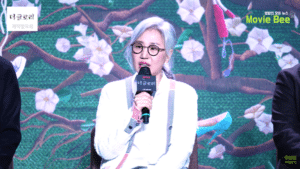
The script for ‘The Glory’ was penned by Kim Eun-sook, a prominent TV screenwriter in South Korea. The inspiration behind the show came from her daughter’s question about whether her mother would be more distressed if she were severely beaten at high school or if she were the one inflicting the harm.
Kim Eun-sook boasts an impressive portfolio of hit shows, including ‘Lovers in Paris,’ ‘On Air,’ ‘Secret Garden,’ ‘A Gentleman’s Dignity,’ ‘The Heirs,’ ‘Descendants of the Sun,’ ‘Guardian: The Lonely and Great God,’ ‘Mr. Sunshine,’ ‘The King: Eternal Monarch,’ and ‘The Glory.’
Certain events in ‘The Glory’ draw from real-life stories such as the “Cheongju Middle School Girl’s Iron Assault Case” and the “Daegu Shaman’s House Prostitution Forced Case.”
Interestingly, Lee Do-hyun, who portrayed Yeo-jeong, and Lim Ji-yeon, who portrayed Yeon-jin, started a real-life romantic relationship following the drama.
Lim Ji-yeon’s portrayal of Yeon-jin marked her first role as a villain.
‘The Glory’ marks Song Hye-Kyo’s debut in the thriller genre.
Regrettably, the drama’s production director, Ahn Gil-ho, confessed his involvement in bullying during his high school years after facing accusations online.

